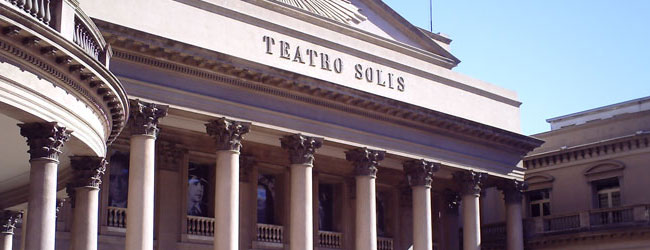Join the UruguayNow mailing list:
UruguayNow in the press
UruguayNow's mix of travel and tourist information on Uruguay, hotel reviews for Montevideo and Punta del Este (coming soon for Colonia), restaurant reviews and tips on excursions, sightseeing and lifestyle in Uruguay has been featured in El Pais, La Republica, MercoPress and on Uruguay's Channel 5 TV and other news media in the country. Internationally, we have had kind mentions in the New York Times and the Daily Telegraph.
Best of the Web
Not yet made it to Uruguay? When you're done with UruguayNow, our choice of the top 6 internet resources for the country is just a mouse click away. In no particular order, they are:
Southern Cone Travel: http://southernconeguidebooks.blogspot.com/
Mercopress: http://en.mercopress.com/
Ola Uruguay: www.olauruguay.com
Retired in Uruguay: http://wallyinuruguay.blogspot.com/
Uruguay Natural: www.uruguaynatural.com
Global Property Guide: http://www.globalpropertyguide.com/Latin-America/Uruguay
For reviews of these sites, please click here.
Other recommended sites

Theatre of dreams
Montevideo's Teatro Solís is a great place to hear live music, opera, or watch modern dance
Legend has it that when the celebrated Italian tenor Enrico Caruso was performing at Montevideo's Teatro Solís towards the end of his career he had trouble with a high note and the audience started to boo him
The story – if true – suggests that Uruguay's opera-goers a century ago were a demanding, difficult crowd. But given that, again as legend has it, Uruguay's ubiquitous Caruso pasta sauce was a creation of the maestro, there is every reason to believe that there was a good deal of affection for him in Montevideo. (Caruso is said once to have ordered a local chef to make up a meal with the ingredients which he had at hand, which were mushrooms, ham and fresh cream – and so a new sauce came into being.)
Pristine after a massive six-year makeover that finished in 2004, the ghosts of Caruso, the tango singer Carlos Gardel and others still seem to inhabit this famous space. And since it is now the turn of the Teatro Colón across the River Plate in Buenos Aires to be closed for extensive refurbishment, there has never been a better time to catch a performance at the Solís.
That the neo-classical opera house was built at all was a triumph for its backers, since the country was at war with itself between 1839 and 1852 and conflict between the Blanco and Colorado parties would continue beyond 1870: "When it was completed in 1856, Uruguay was going through a period of crisis, and the country was mired in poverty," explains communications director Elena Firpi. When construction of the opera house began in earnest in 1852 Montevideo had only 34,000 inhabitants, and the city was at permanent risk of cholera outbreaks, among other threats.
"On top of all that, there were political squabbles over its design," says Ms Firpi. "But over time the identity of the city of Montevideo, the aspirations of its people, and the development of the theatre, have become closely linked."
The opera house stands at the edge of Plaza Independencia, on the fringe of the Old Town, a little set back from the square and in the next block to the shiny, new Uruguayan Presidency building – architecturally, a huge contrast. It was named for Juan Díaz de Solís, the Spanish navigator who sailed up the River Plate in 1516 and in so doing was the first European to set foot in what is now Uruguay (he was probably killed by the local Charr�a people).
Lamps and candles illuminated the theatre's inaugural performance – Guiseppe Verdi's Ernani, which had been premiered in European capitals a few years previously. The first opera season contained ten works in all, almost all by Verdi, who had overtaken Rossini as the composer of the moment. The European tradition of the Teatro Solís was underscored in its choice of English chandeliers and the prominent inscriptions of names of European composers in its interior, as in the legendary opera house in Manaus, Brazil.
Milton Schinca notes in Boulevard Sarandí, his anecdotal history of Montevideo, that a few days after the Teatro Solís opened, and in the middle of a performance, members of the public seated in the stalls began to pelt those in the galleries with oranges. We can suppose from Mr Schinca's account that bad feeling between supporters of the Blanco and Colorado political parties was the cause.
Teatro Solís ceased to function as a private concern in 1947 and was bought by Montevideo city council. After its US$20 million facelift, the theatre has 1256 seats and capacity for 60 musicians. And if you are in Montevideo in season and you are lucky enough to get a ticket, you can still see opera there.
Factfile: Depending on the performance – plays are generally less expensive than opera or dance – you can get tickets for between 150 and 1500 Uruguayan pesos (US$7.50 to US$75). Tickets are not available online. Guided tours of the building are generally held at 11 am, 12 noon and 5 pm every day except Monday. Tours cost 20 pesos in Spanish and 40 pesos in English, but they are free on Wednesdays. We recommend you consult the theatre's website for the latest information: www.teatrosolis.org.uy; tel. 1950 3323
